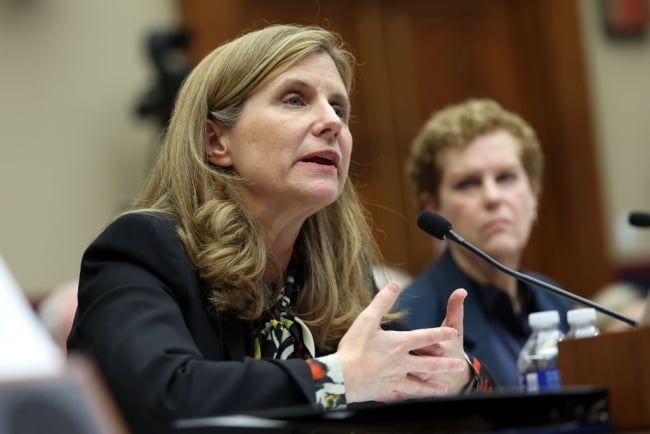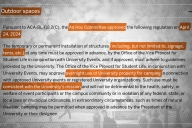You have /5 articles left.
Sign up for a free account or log in.

Liz Magill resigned after widely criticized remarks at a congressional hearing.
Kevin Dietsch/Getty Images
After less than two years on the job, University of Pennsylvania president Liz Magill resigned Saturday. The move came just days after her widely criticized comments about antisemitism at a congressional hearing, though Magill had faced months of mounting pressures over her response to the Israel-Hamas war.
Magill resigned voluntarily, according to a statement from Penn’s Board of Trustees, which made no mention of the controversies that ultimately upended her presidency.
“It has been my privilege to serve as President of this remarkable institution. It has been an honor to work with our faculty, students, staff, alumni, and community members to advance Penn’s vital missions,” Magill said Saturday in a board statement announcing her resignation.
She will remain a tenured faculty member and stay in place until an interim president is selected.
Penn’s board chair, Scott Bok, also stepped down Saturday, issuing a statement in which he defended Magill against charges of antisemitism while adding that she made a “very unfortunate misstep” following “five hours of aggressive questioning before a Congressional committee.”
Bok said that Magill was “over prepared and over lawyered given the hostile forum and high stakes” and “provided a legalistic answer to a moral question” at the hearing last week.
Bok will be replaced by vice chair Julie Platt, who has agreed to serve in the role through January, according to a board statement. Platt, who is chair of the Jewish Federations of North America, said she will only serve in the role temporarily given her other board commitments.
Mounting Pressure
Initial tensions on the Penn campus predate the Oct. 7 Hamas attacks on Israel.
In September, Penn held a Palestinian literature festival that included several controversial speakers. Administrators permitted the event to proceed despite criticism from powerful Jewish advocacy organizations. That decision, cheered by academic freedom advocates, infuriated donors and outside groups.
After Hamas launched its deadly attacks on Israeli civilians in early October, critics took issue with Magill’s initial statement, which they felt did not adequately condemn the perpetrators of violence. They blasted her for failing to call Hamas a terrorist group and for not forcefully denouncing antisemitism. Magill then issued a second statement seeking to appease Penn’s furious donors and others.
But it was ultimately her remarks at a congressional hearing on antisemitism in higher education last week that sank Magill.
Speaking alongside Sally Kornbluth of the Massachusetts Institute of Technology and Claudine Gay of Harvard University, Magill stumbled through questions about battling antisemitism on campus while upholding university free speech policies, failing to clearly state that calls for genocide would be unacceptable at Penn.
(The hearing would be parodied on Saturday Night Live a few nights later, indicating just how quickly it became a cultural phenomenon.)
Though Magill apologized and sought to clarify her comments in a video posted online, the damage had been done. Pennsylvania’s Democratic governor, Josh Shapiro, called her comments “unacceptable” and “shameful,” while 74 members of Congress signed a letter calling for Magill to be fired alongside Gay and Kornbluth. Outraged donors threatened to close their checkbooks, and Penn stood to lose millions of dollars as philanthropists walked away.
Critics Rejoice
Critics celebrated the news of Magill’s resignation.
Republican representative Virginia Foxx, chairwoman of the House education committee, who oversaw the congressional hearing, said in a statement that she welcomes Magill’s departure.
Fellow Republican representative Elise Stefanik, who grilled the three presidents at the hearing, celebrated Magill’s resignation in a post on X, writing, “One down. Two to go.” Stefanik also called for Harvard and MIT “to do the right thing,” adding, “the world is watching.”
Stefanik’s performance at the congressional hearing drew praise from former president Donald Trump. Speaking at the New York Young Republican Gala on Saturday, Trump credited Stefanik for peppering the university presidents with “complex” questions that they failed to answer adequately.
“I guess they’re all going to be losing their job within the next day or two,” Trump predicted.
While much of the condemnation stemmed from Republicans, the Biden administration also criticized the three presidents for equivocating when asked whether they would condemn calls for genocide against Jewish people, though it is not apparent such a threat has emerged at Penn, Harvard or MIT.
“It’s unbelievable that this needs to be said: calls for genocide are monstrous and antithetical to everything we represent as a country. Any statements that advocate for the systematic murder of Jews are dangerous and revolting—and we should all stand firmly against them, on the side of human dignity and the most basic values that unite us as Americans,” a White House spokesperson said last week.
Fears for the Future
Free speech advocacy organizations, however, suggested that concerns over antisemitism in higher education could be leveraged to undermine open dialogue on college campuses.
No sooner had Magill resigned than a member of Penn’s Open Expression Committee, Claire Finkelstein, who is also a law professor, called for restricting speech on campus to battle antisemitism.
“The crisis of antisemitism in our universities mirrors the crisis in our democracy. Isn’t it time for university presidents to rethink the role that open expression and academic freedom play in the educational mission of their institutions?” Finkelstein wrote in a Washington Post opinion piece.
That op-ed prompted immediate backlash from free speech advocates.
“There is such primitive thinking on this issue. NO, restricting speech about Israel/Palestine will accelerate group polarization, increase radicalization, & supercharge hostilities. By all means, punish true threats, incitement, or discriminatory, harassment, but punishing speech, even if offensive, on a particular topic will reliably & predictably make matters worse,” Greg Lukianoff, president and CEO of the Foundation for Individual Rights and Expression, wrote on X.
PEN America released a statement on Saturday in which Jonathan Friedman, director of free expression and education, called Magill’s resignation a “testament to the dilemmas of maintaining a campus that both upholds uncompromising free speech protections and facilitates an open, equitable environment for all students, regardless of race, religion or nationality.”
The advocacy group also called for colleges to stand strong on free speech protections.
“We hope that this development does not serve as an invitation for politicians or donors to try to exert undue control over our higher education institutions,” Friedman said in the statement. “Rather, it should spur a recommitment from universities to more forcefully embrace this dual responsibility, creating campuses where bigotry is rejected and free speech can thrive.”
In the aftermath of Magill’s resignation, the Penn chapter of the American Association of University Professors released a statement condemning the role outside forces played in determining the fate of the university’s leader. It also accused donors and politicians of misrepresenting concerns about Palestinian casualties amid sweeping attacks from the Israeli military, which have led to thousands of civilian deaths.
“The ability of donors, lobbying groups, and members of Congress to destabilize the University of Pennsylvania reveals the need to restore a strong faculty voice in the governance of the institution,” read the AAUP statement in part. “The next president must defend the principles of shared governance and academic freedom, which protect the educational mission of the university. And they must correct what has become a dangerous myth suggesting that the defense of academic freedom and open expression is in any way contradictory to the fight against antisemitism. We intend to see that Penn’s next president lives up to this responsibility.”
With Magill out, critics are now watching the fates of Kornbluth at MIT and Gay at Harvard.








